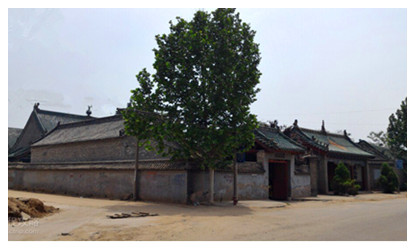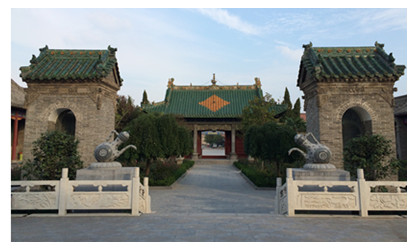Skype: neodalle-travel
Tel: +86 135 7447 2266
E-mail: sales@zhangjiajieholiday.com
Kaifeng Synagogue,or Kaifeng Jewdaism Mosque,is lolcated in Zhuxian Town,23km south of Kaifeng City, Henan Province. it is the only Jewish synagogue in China whose origins can be traced back to the earliest migration of Youtai ("Jews") to the country, who are believed to have arrived in China from Central Asia, possibly from India.
 The synagogue was allegedly built in 1163 – Kaifeng (formerly known variously as Bianliang) was the capital city of the Song (960-1279) Dynasty. The synagogue was unfortunately destroyed in the 1860s and was never rebuilt.Thanks, however, to the French-Chinese priest, Meng Zhengqing, who once sketched two pictures of this synagogue – one depicting the entire synagogue and one depicting the synagogue's inner decoration – the true appearance of Kaifeng's old Jewish synagogue can be seen.
The synagogue was allegedly built in 1163 – Kaifeng (formerly known variously as Bianliang) was the capital city of the Song (960-1279) Dynasty. The synagogue was unfortunately destroyed in the 1860s and was never rebuilt.Thanks, however, to the French-Chinese priest, Meng Zhengqing, who once sketched two pictures of this synagogue – one depicting the entire synagogue and one depicting the synagogue's inner decoration – the true appearance of Kaifeng's old Jewish synagogue can be seen.
The site where the synagogue once stood, behind a row of busy shops in a merchant district during the period in question, is situated in Tiger Hole Street in the village of Zhuxian. Buses from Kaifeng Coach Station regularly service Zhuxian. The fare is 7 yuan per direction. The Chinese Spring Festival pictures that are produced at the site of the synagogue are decidedly worth the price.
Looking at the synagogue's two pictures, one can determine the scale of the building, which appears to be 130 meters long from west to east, and 50 meters wide from north to south. Behind the entrance gate to the synagogue was a decorated archway with a name plate hanging above it, on which were inscribed the words Jing Tian Zhu Guo ("Worship Heaven and Revere the Nation"), allegedly written by Emperor Kangxi, China's longest-ruling emperor and whose reign (CE 1661-1722) belonged to the Qing (CE 1644-1911) Dynasty. In the main hall, whose name was Yi Ci Le Ye Dian, stood two monuments, one entitled Kang Xi Er Nian Bei ("The Second Year of the Reign of Emperor Kangxi") and the other entitled Hong Zhi. Behind the main hall was a library that contained many religious texts, most of which were allegedly stolen by missionaries from various European and American churches.
Despite the claims to historical authenticity, doubt has been cast on the link between the alleged Jewish community in Kaifeng and international Jewry, both with respect to the religious practices of the alleged Kaifeng Jews, their religious texts, and the alleged synagogue in Kaifeng, of which only the representational sketchings by the above-mentioned French-Chinese priest serve as proof of what the alleged synagogue is supposed to have looked like.
 According to Dr. Zhou Xun, a research fellow at the School of Oriental and African Studies (SOAS) in London and author of the book Chinese Perceptions of the Jews and Judaism: A History of the Youtai, the notion of the link between what is believed to have been a Jewish community in Kaifeng and "Jewishness" is largely a Western cultural construct. For example, Dr. Xun has pointed out that the alleged Jewish community in Kaifeng possessed no Torah scrolls until 1851, when they suddenly appeared and were snapped up by eager collectors. (NB: The creation of fake documents – especially fake religious documents which appear to be authentic in every respect, and for which collectors are willing to pay astronomical sums – though not exactly a cottage industry, is nevertheless a made-to-order industry often created by the excessive demand for the "product".)
According to Dr. Zhou Xun, a research fellow at the School of Oriental and African Studies (SOAS) in London and author of the book Chinese Perceptions of the Jews and Judaism: A History of the Youtai, the notion of the link between what is believed to have been a Jewish community in Kaifeng and "Jewishness" is largely a Western cultural construct. For example, Dr. Xun has pointed out that the alleged Jewish community in Kaifeng possessed no Torah scrolls until 1851, when they suddenly appeared and were snapped up by eager collectors. (NB: The creation of fake documents – especially fake religious documents which appear to be authentic in every respect, and for which collectors are willing to pay astronomical sums – though not exactly a cottage industry, is nevertheless a made-to-order industry often created by the excessive demand for the "product".)
Moreover, the alleged Jewish community in Kaifeng, according to Dr. Xun, anachronistically claims to have observed certain Jewish religious practices whose actual origins among Jews the world over date from a later period. And finally, the authenticity of the drawings of the alleged Jewish synagogue in Kaifeng, allegedly undertaken by a certain priest by the name of Meng Zhengqing, has been questioned by Dr. Xun, who claims that the drawings have been doctored to make the buildings better conform to Western/ Jewish notions of what a synagogue is supposed to look like. The conclusion reached by Dr. Xun is that the alleged community of Jews living in Kaifeng was in fact not Jewish in any meaningful sense.
Travel Tips
Address: Tiger Cave Street, southeast of Zhuxian Town, Xiangfu District, Kaifeng City
Opening hours: 9:00-19:00
 Ask Questions ?
Ask Questions ?